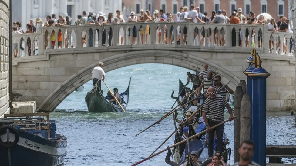
Venice in north east Italy, built on more than 100 small islands in a lagoon (环礁湖) in the Adriatic Sea, is surrounded by water and many people use canals and boats to get around. An estimated 30 million tourists come to Venice each year, but despite its popularity, a new charge has been introduced for people visiting on busy days. People visiting Venice on day trips have to pay a five euro tax from Saturday 27 April to Sunday 14 July.
Lots of tourists visit Venice — the city itself only has a population of 50,000 people, and it can get very busy in peak seasons. People who live in the city have complained that tourism is making the historic site overcrowded, and that people often leave litter and mess after visiting. It’s hoped that the charge will encourage less people to come on already-busy days, to avoid overcrowding.
Day trippers will only have to pay the tax if visiting the “old city” — which is the area inside the lagoon, and includes major tourist locations and famous bridges. Anyone visiting Venice just for the day between 8:30 AM and 4 PM will pay the tax. If you’re staying inside the City of Venice, which is the lagoon area, you won’t have to pay as you’re already staying there. Also if you’re a resident or you own a property there, you won’t have to pay. You also won’t have to pay if you’re under 15, working in the area, or studying in Venice. There are already charges for people visiting Venice anyway, which people usually pay if they are staying in accommodation.
People will be able to pay the charge on their phones and download a QR code to show to inspectors. They will check people at random in common arrival areas, like the train station. Those without a ticket risk getting a fine ranging from 50-300 euros.
1.What is TURE about Venice according to the passage?
A It’s welcomed among Europeans.
B People get around only by water.
C It’s a big city with lots of people.
D It’s a city of great historical significance.
解析:选D。D细节理解题。根据第二段第二句的“the historic site”可知,威尼斯是一座古城,具有重要的历史意义。故选D。
2.Venice collects taxes to ____________.
A earn good money
B save tourism industry
C protect cultural heritage
D improve the environment
解析:选D。D推理判断题。根据第二段最后两句内容可知,居住在威尼斯的人们抱怨,旅游使得威尼斯变得 拥挤不堪,人们经常在参观后留下垃圾,希望这项收费能减少高峰期的游客,避免过度拥挤(即改变现在的环境)。故选D。
3.Who will be fined without a ticket paying tax?
A Tony, 28, an overnight stay visitor.
B Jane, 13, a middle school student.
C Mario, 15, a native of Venice.
D Lucy, 30, a one-day visitor.
解析:选D。D推理判断题。根据第三段可知,一日游游客在上午8点30到下午4点之间参观威尼斯需要交税,过夜游客、15岁以下一日游游客、威尼斯当地人均无需交税。故选D。
4.In which part of a newspaper can we most probably read the passage?
A Law.
B Travel.
C Culture.
D Politics.
解析:选B。B推理判断题。根据全文内容可知,文章主要讲了威尼斯从4月27日起对一日游游客收税,属于旅游方面的内容。故选B。